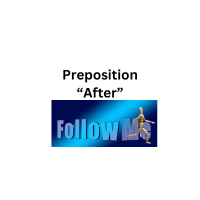Preposition – “After”

Preposition – “After”
Preposition “After” with the meaning -later:
Here are some examples of how the preposition after can be used with the meaning of later:
I’ll call you after I finish my meeting.
She always eats dessert after dinner.
We can discuss this issue after the presentation.
Let’s meet up for coffee after work.
After the movie, we went out for ice cream.
After the rain stopped, the sun came out.
I’ll text you after I arrive at the airport.
After the exam, I felt a sense of relief.
After the concert, they met the band backstage.
Please clean up your room after you finish playing.
In all these sentences, after is used to indicate a point in time that is later than another event or action.
Preposition “After” with the meaning -behind or following:
Here are some examples of how the preposition after can be used with the meaning of behind or following when referring to a place:
The cat chased after the mouse.
He’s always right after me.
The children ran after the ice cream truck.
She walked after her older sister.
The dog followed after its owner.
The car drove after the ambulance.
The hikers trudged up the hill, one after the other.
The team ran after the soccer ball.
In these sentences, after is used to indicate the position of one thing or person in relation to another, with the meaning of behind or following.
“After” as a conjunction with the meaning-
subsequent to or following:
The word after can be used as a conjunction to indicate a time relationship, but it typically conveys the meaning of subsequent to or following.
Here are examples of after used as a conjunction in this sense:
After I finish work, I’ll meet you for dinner.
(In this sentence, after is a conjunction indicating that meeting for dinner will happen subsequent to finishing work.)
They went to the beach after the rain stopped.
(Here, after as a conjunction shows that the trip to the beach occurred following the cessation of rain.)
After he submitted his application, he waited anxiously for a response.
(In this case, after signifies that waiting for a response took place after the application was submitted.)
So, after as a conjunction indicates a temporal relationship between two events or actions, where the second event follows the first in time.
Here’s a list of phrases and word combinations using after in various contexts:
Afternoon: The time period following the morning and preceding the evening.
Aftermath: The consequences or results of a significant event, usually negative.
After-party: A social gathering that takes place following a larger event, like a concert or a party.
Afterthought: A reflection or consideration that occurs later, often added to something that has already been said or done.
Afterlife: The existence or state believed to follow death, according to various religious or spiritual beliefs.
Afterburner: A device in some jet engines that increases thrust for short bursts of speed.
Aftertaste: The lingering flavor or sensation that remains in the mouth after consuming food or drink.
Afterward(s): Referring to a subsequent point in time, synonym for later.
Afterglow: A warm, pleasant feeling that follows an enjoyable experience.
After-school: Programs or activities that take place outside regular school hours.
Afterimage: A visual sensation that persists briefly after the stimulus causing it has ceased.
Afternoon nap: A short sleep taken in the afternoon, often to rest and recharge.
After-sales service: Assistance or support provided by a company to customers after a purchase.
Afternoon tea: A light meal, typically consisting of tea, sandwiches, and pastries, served in the late afternoon.
Common phrases and word combinations that use after:
Day after day: Refers to something that occurs repeatedly or continuously, one day following another.
After all: Used to introduce a statement that provides a reason or justification for what was previously said.
The day after: Refers to the day following a specific event or date.
One after another: Indicates a continuous sequence of events or actions.
After dark: Refers to the time of day after sunset when it becomes dark.
After hours: Activities or events that occur after regular business hours or official closing times.
After the fact: Refers to something that is done or discovered after an event has already taken place.
Day after tomorrow: Refers to the day that follows tomorrow.
Year after year: Indicates a continuous or repeated occurrence over the course of multiple years.
Life after death: Refers to the concept or belief in an existence or state of being that follows one’s death, often in a spiritual or religious context.
The Preposition place in sentences